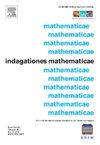一个Carleson型测度和一个Möbius不变函数空间族
IF 0.5
4区 数学
Q3 MATHEMATICS
引用次数: 0
摘要
对于0<s<1,设{zn}是开单位圆盘上的一个序列,使得∑n(1−|zn|2)sδzn是s-Carleson测度。本文利用Volterra型算子、Blaschke积的倒数、具有规定零序列的二阶复微分方程,研究了s- carleson测度与Möbius不变F(p, p-2, s)空间理论之间的联系。本文章由计算机程序翻译,如有差异,请以英文原文为准。
A Carleson type measure and a family of Möbius invariant function spaces
For , let be a sequence in the open unit disk such that is an s-Carleson measure. In this paper, we consider the connections between this s-Carleson measure and the theory of Möbius invariant F(p, p-2, s) spaces by the Volterra type operator, the reciprocal of a Blaschke product, and second order complex differential equations having a prescribed zero sequence.
求助全文
通过发布文献求助,成功后即可免费获取论文全文。
去求助
来源期刊
CiteScore
1.20
自引率
16.70%
发文量
74
审稿时长
79 days
期刊介绍:
Indagationes Mathematicae is a peer-reviewed international journal for the Mathematical Sciences of the Royal Dutch Mathematical Society. The journal aims at the publication of original mathematical research papers of high quality and of interest to a large segment of the mathematics community. The journal also welcomes the submission of review papers of high quality.

 求助内容:
求助内容: 应助结果提醒方式:
应助结果提醒方式:


